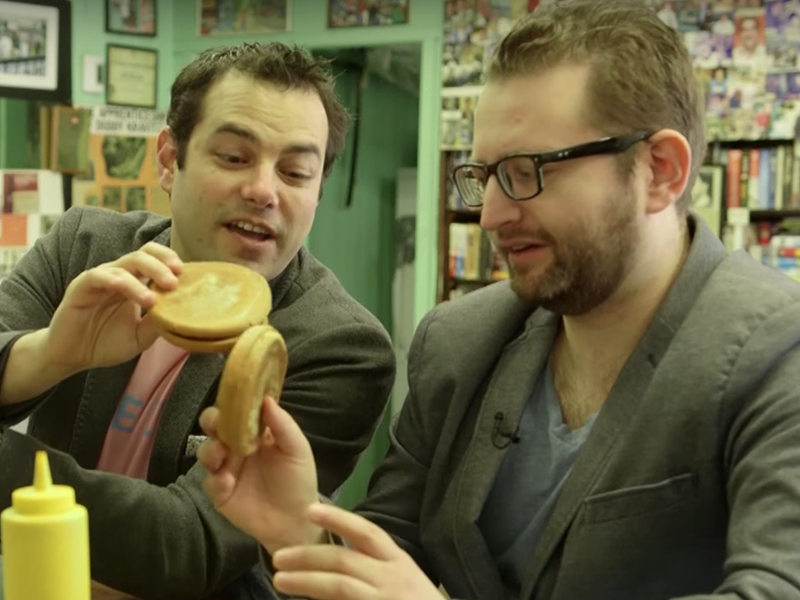The zany duo behind YidLife Crisis are back doing what they do best – chowing down and rapturously talking about the food between mouthfuls, all in the name of exploring Jewish identity.
Eli Batalion and Jamie Elman have made their first feature-length film called Chewdaism: A Taste of Jewish Montreal, in which they consume a half-dozen meals in the course of a single day, as they stroll around town.
Unlike the original YidLife Crisis comedy web series, the hour-long Chewdaism is in English with only a few Yiddish words thrown in.
After shooting scenes of them downing popular foods in other places, Batalion and Elman return to their hometown and to their gastronomic roots in this documentary.
READ: THE YIDLIFE CRISIS GUIDE TO THE CANNABISL ACT
Their guide on much of the journey is Zev Moses, the executive director of the Museum of Jewish Montreal.
Historian Pierre Anctil offers his observations on the outsized influence that Jews, particularly those who arrived from eastern Europe in the early 20th century, had on Montreal.
Chewdaism is a history lesson about the Montreal Jewish community in comic disguise that’s told through the stories of succeeding waves of immigrants over the past century.
The duo make sure the learning is fun, playing to their original characters. The eateries they frequent are familiar to Montrealers, Jewish or not. In fact, they are emblematic of the city.
The boys start in the Plateau – the old Jewish immigrant district that’s now a trendy borough – breakfasting at the Fairmount bagel bakery. They shmooze with owner Irwin Shlafman, whose Russian grandfather founded the business in 1919.
The first course: bagels with lox and cream cheese – what else?
Then it’s on to Wilensky’s, which was founded in 1932 and is still owned by the same family, the décor and menu unchanged, for a “light lunch” – a grilled salami and baloney sandwich – which Moses informs the viewers was all the garment workers of yesteryear had time and money for.
They continue north on St-Laurent Boulevard, imagining the bustling commercial artery “with a shtetl vibe,” where everything the community needed was at hand – from a maternity hospital to a monument maker. Reminders of that rich past are still abundant.
 For their “heavy lunch,” they head to Schwartz’s, now 90 years old and owned by non-Jews, including singer Céline Dion, who has a minority interest. Like Wilensky’s, nothing about the restaurant has been altered, and it’s a magnet for celebrities and tourists.
For their “heavy lunch,” they head to Schwartz’s, now 90 years old and owned by non-Jews, including singer Céline Dion, who has a minority interest. Like Wilensky’s, nothing about the restaurant has been altered, and it’s a magnet for celebrities and tourists.
A quick stop is made at Cinéma l’amour, an adult movie house, for historical research, of course. It was once the Globe Theatre, where Yiddish and vaudeville shows were put on.
After Mile End, where such community institutions as the YMHA and the Jewish Public Library were clustered, the flaneurs swing west into Outremont’s Hasidic neighbourhood. It seems like a step back in time.
After some serious discussion with Hasidic borough Coun. Mindy Pollak and academic Steven Lapidus about tensions with non-Jewish residents and why these Jews who arrived after the war remain insular, Elman and Batalion find relief at Cheskie’s.
This “heimishe bakery,” which is owned by Hasidim, probably draws as many non-Jews as Jews for its mouthwatering pastries.
The guys leave with a chocolate babka that they quickly devour on the street.
After all this Ashkenazic fare, the pair travels across town to Côte-St-Luc, where they grew up in the 1980s, to sample some Sephardic food, which was introduced to Montreal after many of them arrived from North Africa and Iraq in the 1960s and ’70s.
![Schwartz’s deli has been a fixture on the Main for more than eight decades. [Jonathan Wenk photo]](https://thecjn.ca/wp-content/uploads/2012/03/deli.jpg)
Chewdaism ends where it started, in the Plateau, at the Museum of Jewish Montreal and its “food space,” Fletcher’s. This is a look at the new generation of Jewish cuisine in the city.
Following trends in New York and elsewhere, in the last five years or so, young Jewish chefs and foodies have been creating their own style of Jewish dishes. They draw on the diversity of Jewish food traditions from around the world, giving them a fashionable freshness.
It’s all good as far as the YidLife fellows are concerned.
Chewdaism is making the rounds at Jewish film festivals. It has been shown at the Victoria, Vancouver and Calgary Jewish film festivals and is set to be shown at the Miami Jewish Film Festival on Jan. 19 and the Atlanta Jewish Film Festival on Feb. 16 and 17.
“It also looks like we’re going to play the Romanian Jewish Film Festival in Bucharest on Dec 16,” added Batalion. They hope to have a special screening in Montreal early next year.
